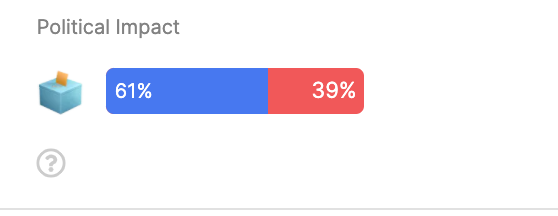
Blog
About Us
Join Newsletter
X
Keep up with Cluey
Sign up for our newsletter.
Blog
About Us
Join Newsletter
X
Keep up with Cluey
Sign up for our newsletter.
My Values
About Cluey
FAQs
Cluey Team
Our Ratings & Data
Cluey Empowers You to Make a Greater Impact:
Cluey’s goal is to empower impact-conscious consumers with the tools to make more informed buying decisions. Additionally, it is critical to our information integrity that the information we share is trustworthy, fair, and objective. There are a few ways that Cluey Consumers can identify a brand’s impact:
Recent News - Timely news articles that are available about a brand and its practices.
Brand Verified Tags - Tags will be populated based on brands being verified to have a certain set of qualifications via third-party sources. This will be expanded based on user interest and data availability.
People Impact Score - People impact scores are calculated by aggregating data relevant to a company’s social stakeholders (treatment of workers and suppliers, impacts on customers, and communities) from best-in-class third-party sources including ESG rating providers, impact assessments, recorded violations and more.
Planet Impact Score - Planet impact scores are calculated by aggregating data relevant to a company’s environmental stakeholders (ecosystems & habitats impact, use of resources, handling of waste, and community impact) from best-in-class third-party sources including ESG rating providers, impact assessments, recorded violations and more.
Political Contributions - Political impacts are determined by aggregating all contributions from a company’s corporate PAC and its employees, specifically for contributions over $1k (typically from high-level executives) that go towards candidates of either major political party in the last three U.S. federal election cycles. This is federally regulated, publicly available data provided by the Center for Responsive Politics. For Political Impact - the blue bar indicates contributions to the U.S. Democratic Party and the red bar indicates contributions to the U.S. Republican Party (GOP).

How We Rate: People and Planet Impact Scores
For our People & Planet Impact Scores, we have identified data partners and sources to reflect three key areas of a company’s behavior:
Transparency - A foundational tenant to how we rate, brands who perform well in this area must be willing to share or report on their impacts throughout their business (including through the use of suppliers, contractors, and vendors).
Current Results - The highest weighted tenant to how we rate, brands who perform well in this area are scoring high marks across various impact assessment tools.
Commitment to Change - An important reminder of the context that change does not occur overnight, brands who perform well in this area display a willingness through industry leadership, shareholder resolutions or otherwise to change their current business practices and operations for the better.
How to Interpret the Scores
Similar to an academic letter grading system, we want our scores to be intuitive to our users so they can easily grasp the severity of a brand’s impact, with a F grade occurring for any brand scoring a cumulative output of 60% or less. Scores are determined through our internal grading rubric that translates, weights, and aggregates results from best-in-class third-party data sources.
A - Excellent
B - Good
C - Satisfactory
D - Less than satisfactory
F - Fail
Our Rating Principles
Principle 1 - We are fair
We choose data sources that incorporate reconciliation and offsetting in the score.
We are not solely basing scores on what a company has done, the results, but how they work towards being better and if they are transparent.
Our ratings include a proportion for companies that operate independently under parent ownership.
Principle 2 - We aim for truth
We continuously re-evaluate our data sources, and are open to choosing the best data sources that allow for the least amount of misinterpretation by our users.
There is no such thing as a perfect brand, so we ensure that our scores are sectioned into issue clusters and we aim to convey the nuance and context through our other showcased areas of brand impact.
We support people to identify what is unnecessary consumption and recognize consuming has been part of our culture.
Principle 3 - We are thinking holistically about stakeholders
We adopt a stakeholder-focused model, thinking beyond just the impact to shareholders in order to maximize value for all stakeholders that can be impacted by a business.
Principle 4 - We don't promote trust washing
Users of Cluey can rest assured that our ratings do not allow companies to game the system with performative activities.
While PR will show up in recent articles, unless they are met with action it won't have an effect on a company’s score
Principle 5 - We aim to dismantle the illusion of choice
Much of consumer choice is concentrated to a few large multinational corporations, even though the ownership of the brands may not be immediately apparent during a purchase.
We help consumers connect the dots between brands and parent companies, and lift this veil over consumer choice.
From our knowledge there are no other databases that connect brand assets to their parent ownership in a centralized and transparent manner.
We do hold the brand accountable and the parent organization as well, making sure we are listing the known owners of the brand.
Our Data Partners and Sources (People, Planet, & Political Impacts):
Sustainalytics - Sustainalytics, a Morningstar Company, is a leading independent ESG and corporate governance research, ratings, and analytics firm. ESG and Sustainability data provided by Sustainalytics and Morningstar. Additional disclaimer: copyright 2021 Morningstar. All Rights Reserved. The information contained herein: (1) is proprietary to Morningstar and/or its content providers; (2) may not be copied or distributed; and (3) is not warranted to be accurate, complete or timely. Neither Morningstar nor its content providers are responsible for any damages or losses arising from any use of this information. Past performance is no guarantee of future results.
Just Capital - Just Capital is an independent, data-driven platform for measuring corporate performance.
B Corp - B Corp certification proves a business meets the highest standards for verified social and environmental performance, public transparency, and legal accountability to balance profit and purpose.
SASB - The Sustainability Accounting Standards Board (SASB) is a nonprofit organization that has developed a set of standards to guide the disclosure of financially material sustainability information by companies.
GRI - The Global Reporting Initiative (GRI) is an international independent standards organization that helps businesses understand and communicate their impacts on issues such as climate change, human rights and corruption.
CDP - CDP is a not-for-profit that runs a global disclosure system for companies to manage their environmental impacts.
HRC - The Human Rights Campaign focuses on protecting and expanding rights for LGBTQ individuals in the workplace by measuring equal protections, inclusive benefits, and corporate social responsibility.
Violation Tracker is a database on corporate misconduct sourced from the Corporate Research Project of Good Jobs First.
As You Sow is a non-profit that promotes environmental and social corporate responsibility by introducing shareholder resolutions to empower shareholders to drive companies toward a more sustainable future.
Center for Responsive Politics (Open Secrets) is a non-profit nonpartisan research group that tracks the effects of money and lobbying on U.S. elections and public policy.
Our Data Partners and Sources (Brand Verified Tags):
We will continue to expand our list of brand verified tags based on user interest, and data availability. At this time, we are currently listing the following tags -
B Corp Certified - B Corp certification proves a business meets the highest standards for verified social and environmental performance, public transparency, and legal accountability to balance profit and purpose.
Roundtable on Sustainable Palm Oil Member - Members of the Roundtable on Sustainable Palm Oil (RSPO) are committed to produce, source and/or use sustainable palm oil certified by the RSPO.
RE100 Member - Members of the RE100 are committed to driving transition to 100% renewable electricity and must meet joining and technical criteria.
Responsible Business Alliance Member - Members of the Responsible Business Alliance are committed to creating shared value for businesses, workers and communities and must meet these member requirements.
Best Place to Work for LGBTQ Equality - Companies recognized by the Human Rights Campaign (HRC) as a best place to work for LGBTQ equality have taken concrete steps to establish and implement comprehensive policies, benefits and practices that ensure greater equity for LGBTQ workers and their families.
Civic Alliance Member - Members of the Civic Alliance are committed to increasing civic engagement by empowering U.S employees with resources and workplace policies to participate civically and work towards higher voter turnout.
Employee Owned - Companies recognized as ‘employee owned’ offer an employee stock ownership plan (ESOP) as a method to provide the company’s workforce with an ownership interest in the company. Data is sourced from the National Center for Employee Ownership (NCEO) annual data collection on all U.S. employee ownership companies.
Latest from Cluey
© 2024 Cluey Consumer, Inc.
Privacy Policy
Contact Us
Disclaimer: some links on this site may contain affiliate links. To learn more about how Cluey makes money, click here.